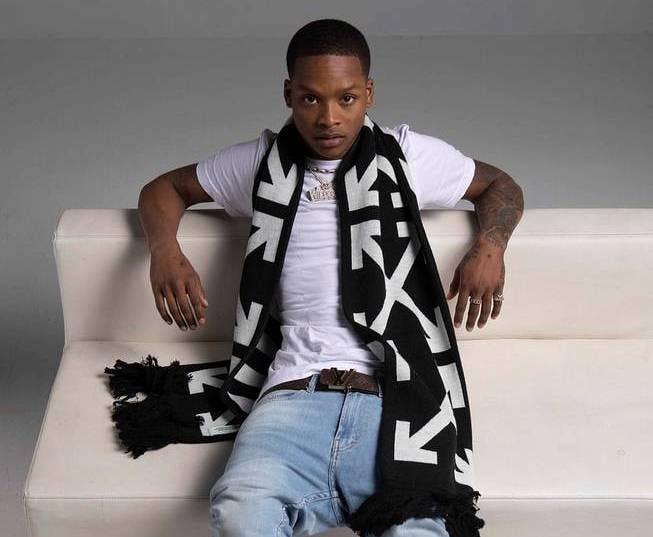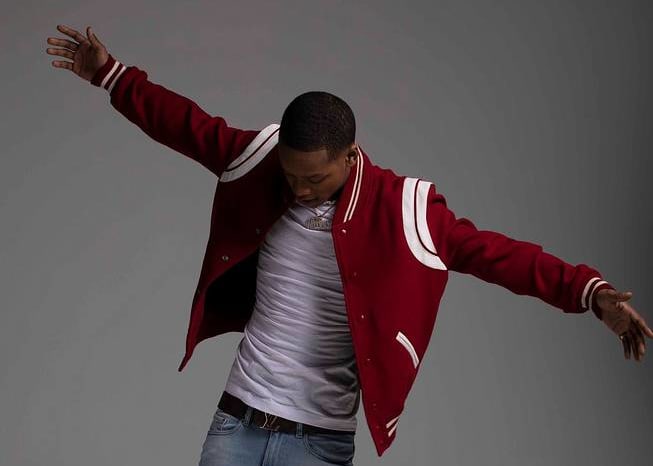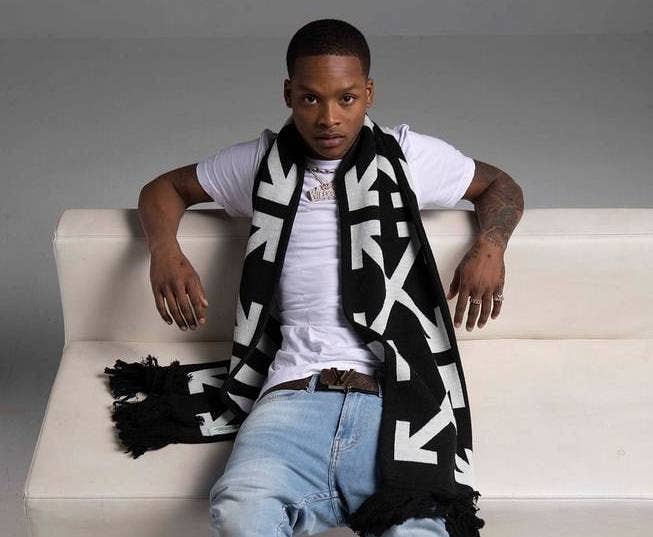
Calboy makes things happen. No sooner has the 19-year-old Midwestern rapper shown up in the lobby of the COMPLEX building than he’s asking his manager to borrow a lighter. But not so he can take a well-deserved smoke break in the midst of a busy press run for Wildboy, his major label debut, but so he that he can singe the loose fibers off the laces on a pair of expensive sneakers.
The impromptu shoe repair scene captures a small piece of what makes the rapper’s music so appealing. Calboy’s songs have a pristine, melodic polish, but they’re informed by grit and DIY savvy. The artist is used to making things happen on his own and forging his own path. His music has the melodic looseness of many of today’s best young rappers, but with a pointed delivery that illustrates more traditional rapping skill.
Calboy is part of an ascendant generation of Chicago rappers like Polo G and Lil Zay Osama who blend the street stories of the drill scene with the more refined song crafting abilities of artists like Chance the Rapper and Joey Purp. But while these MCs are still rising, their movement might already have its defining anthem in “Envy Me,” Calboy’s platinum certified smash that has already racked up 120 million Spotify streams since its release last fall.
The song is urgent and elegant, with Calboy’s nimble tenor maintaining melody even during the verse’s more rapid fire cadences. Although there are moments of triumph, the ache in his voice makes it clear Calboy isn’t going for one-sided glorification in his music. “I feel like we’re just reality artists,” he says. “We’re not just stuck on one subject, we speak on life as a whole, whether that’s relationship problems, community problems, street problems, anything.”
That concept is evident on his breakout mixtape, Anxiety, where he talks candidly about the trauma he’s experienced and how it has affected his mental health, as well as Wildboy highlights like “Unjudge Me” and “Ghetto America.”
Shortly before the release of Wildboy, Calboy stopped by our office to discuss the state of Chicago hip-hop, working with stars like Lil Durk and Meek Mill, and his creative passions outside of music.
You’re coming off playing Rolling Loud, how was that?
The crowd was rocking. I feel like more and more people are getting in tune to my music. I thought it was going to be a little weaker than it was, actually. They knew the words to all the songs and was rocking with me. It used to just be [“Envy Me”], but now it’s starting to be them knowing all the music, so it’s kind of the same as the reaction in Chicago.
You represent Chicago and have spoken about things like playing the United Center being a major accomplishment in your career. How do you balance your goals in your hometown with national aspirations?
I feel like I treat Chicago like home, but it’s like working in any other city. I feel like I work just as hard anywhere. That’s why I might seem in the middle, like Chicago-rooted but on some going national type shit.
You came up through the YOUMedia arts initiative that also gave Chance the Rapper his start.
Mhmm, a little bit. I started to go downtown a bit and rock with the YOUmedia program and all that shit, but I kind of branched out and did my own thing. I taught myself everything... I tried [YOUMedia] and it was cool, but it wasn’t all the way my energy.
Have you always been that way, where you need to figure out the path on your own and not through something that structured?
Yeah, for real.
When you recorded “Envy Me,” did you have a sense it would be a career-making song?
Nah, I didn’t. I just made the song like how I would make any other song.
What is your typical studio process? Are you a writer or do you get in the booth and see what comes to you?
I just vibe with the music and then punch in the words later.
I go in there with a concept. That’s what makes me different than a lot of the mumble rappers. You’ve just got to let the music speak to you.
That’s a bit surprising, because your songs are pretty cohesive narratively and I feel like a lot of artists who freestyle just kind of bounce from thought to thought without much through line.
See, that’s the whole thing. I go in there with a concept. That’s what makes me different than a lot of the mumble rappers, because a lot of the mumble rappers do that. You’ve just got to let the music speak to you. It’s going to give you a topic. All you have to do is go in there and really compare and contrast what you’re going through and how that fits with the topic you want to make a song about. It’ll come out however you want it to. It’s easy to create the music when the vibe is there, when you’re in good spirits, when you’ve got good spirits around you. That’s a big plus for me.
You hear that a lot, but when an artist starts buzzing the way you are now, then it becomes easy for their circumstances to change. You end up in different studios with unfamiliar faces. You’ve got a lot of big names on this project like Yo Gotti and Young Thug, so how do you preserve that vibe?
I’ve got to be in those circumstances that I’m used to so I can make the music. If any one of those big names on my project wasn’t vibing with me right, then they wouldn’t be on there.

Polo G appears on “Caroline,” and the two of you seem to be part of this third wave of Chicago rappers along with people like Queen Key and Lil Zay Osama. Do you feel like you’re all part of a cohesive scene right now?
It’s definitely been like—I would say three waves as well. At the same time, when the newer wave comes, the older wave starts to reach out, but [our generation] has to identify itself. Everybody is reaching out now, but we had to make names for ourselves first. We had to identify that we’re the next ones up and then everybody started reaching out. So it’s not a whole cohesive thing altogether, there are steps.
Was there anyone from earlier movements in the city that you really wanted to collaborate with or gravitated towards?
Chance, [G] Herbo, and Sosa. Kanye, too. That’s the only person I ain’t got up with though. Everything that I was looking forward to and wanting to obtain, I got.
I was wondering, when you were first coming up, you got a lot of Durk comparisons. And I know you got him on the record, so how did that come about?
I really ignored the Durk comparisons for a long time. I made a comment recently like, “Oh, it’s getting old.” I usually just let it be what it’ll be. Durk is cool, he reached out to me and said, “You working, so let’s put something together.” We agreed to do swaps—I’m on his project, he’s on mine.
when the newer wave comes, the older wave starts to reach out, but [our generation] has to identify itself. Everybody is reaching out now, but we had to make names for ourselves first.
So what got you into that headspace to make “Ghetto America” with him?
Really, I pulled up on [Yo] Gotti that day. I had already sent him that track, and then Durk just so happened to be across the hall in the studio. My DJ went over there and hollered at him and we all ended up coming to one studio. I played the song, Durk was like, “Let me throw a verse on there.” It just worked like that, we just all so happened to be in the same area.
One of the tracks that I wanted to ask about is “Unjudge Me” with Moneybagg Yo. You talk on the song about people making incorrect assumptions, so are there misconceptions about you out there?
In Chicago, it’s always a group that’s got to prove itself. I ain’t ever been one of those, so I just spoke about that in that song, as far as the street shit goes. It’s really just about people not knowing what’s going on and speaking like they do, really. That’s what “Ghetto America” is kind of about as well. They don’t understand that the stuff they capitalize on and broadcast in the media is somebody’s suffering. That’s the type of shit I was speaking on.
You’ve got songs talking about things happening in the streets, but it doesn’t feel like you’re glorifying anything or making it out to be more than it is.
That’s right, it just what it is. It’s just real. I feel like we’re just reality artists. We’re not just stuck on one subject, we speak on life as a whole, whether that’s relationship problems, community problems, street problems, anything.
In another interview, you said that you have to write with it in mind that someone is going to identify with what you’re saying and relate to it. It’s not just about your perspective, but how through your music it can color another person’s.
For sure, that’s 100 percent. I just think about the shit that I’m going through, but I try to figure out how to relay the messages to let folks know that other people are going through the same type of shit. I try to make it as relatable as possible.
Do you think enough people in hip-hop nowadays think that way about the impact of their music? Or do people mostly make music based on other motives?
I feel like it’s 50-50. I’m new, I’m like the rookie in the industry right now, but as I learn and observe and analyze these folks that I meet—these rappers, artists, actors, whoever they may be—I just realize that there are different personalities from different folks. There are a few artists I’ve ran into that are really thinking about what they’re saying and want to make an impact, and then it’s a few that are like, “We’re just making noise, really.” I feel like it’s 50-50, and it’s always going to be 50-50. It’s always a complete and equal opposite going on, I feel.
There are a few artists I’ve ran into that are really thinking about what they’re saying and want to make an impact, and then it’s a few that are like, 'We’re just making noise, really.' I feel like it’s 50-50, and it’s always going to be 50-50.
You said you want to talk about what’s happening in your life, and one notable thing you addressed is mental with your Anxiety mixtape. Have you had fans reach out to you about the impact of that project?
Yeah, I definitely did. It was kind of a delay, I had to pop a little bit more, but I’m definitely getting all types of messages about how I helped people through certain situations. I always get those.
You did that tape before “Envy Me” and before Wildboy. How did that tape affect the way you make music now?
It zooted me up, it really boosted my confidence. It did a lot to me mentally to get me to keep going. That was the first of me seeing real progress. We dropped a project before that and it was cool, I got a little buzz, but Anxiety was what woke everybody up in the city. Then I dropped Calboy, that was the biggest thing. It all built up to “Envy Me.” We dropped “Envy Me” right after that, so I really did take the steps and progress. And I’m still progressing, just seeing more and more improvement.
Meek Mill appears on “Chariot,” and I know you two have a bit of a history. What’s your relationship like with him?
Meek’s cool. We vibe, holler at each other. He gives me some boss pointers. He knows I’m already a strong individual, so it’s not like he’s really got to coach me. He just gives me pointers and we chill. [He wants] to make sure all the young n*ggas is where they’re supposed to be.
I learned recently that you have other artistic interests outside of music like writing and painting. The last thing I saw was that you were working on a sci-fi book, could you tell me a bit about that?
It’s almost done. It was in the works for a while, but I’m almost done with the actual writing of it. I want to figure out how I can condense it a little bit, because it’s a little lengthy. I’m probably going to get ready to publish that at the end of this year or next year, just to make sure it’s perfect.
I interviewed Issa Gold from The Underachievers and he was telling me he’s also writing a book. It must be satisfying to have such a different outlet for your creativity beyond rapping.
It definitely is. It’s a way that you can show off your skills with the writing, but I like it because it’s art. It’s bringing the fantasies in your imagination to life. Once you put it on paper, it’s reality. It becomes something.



